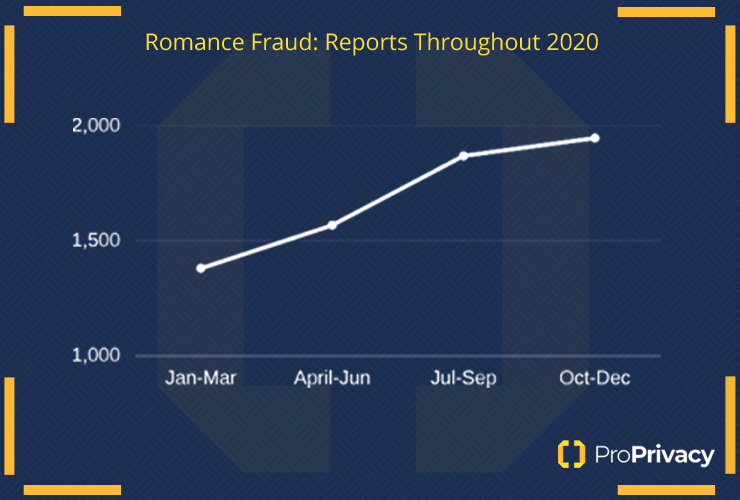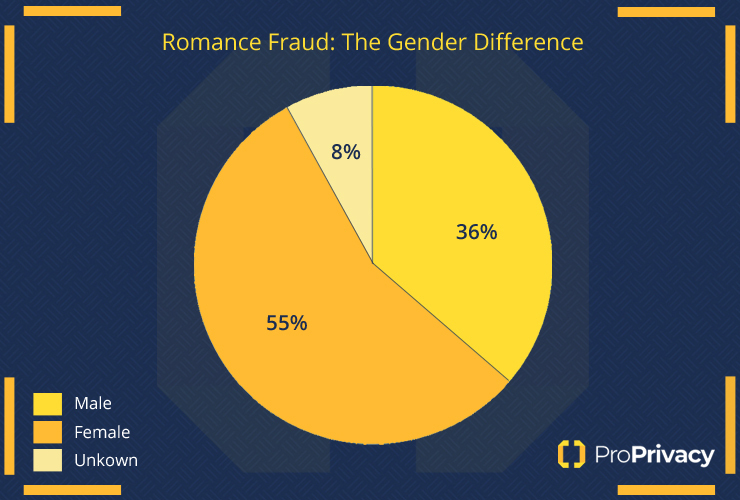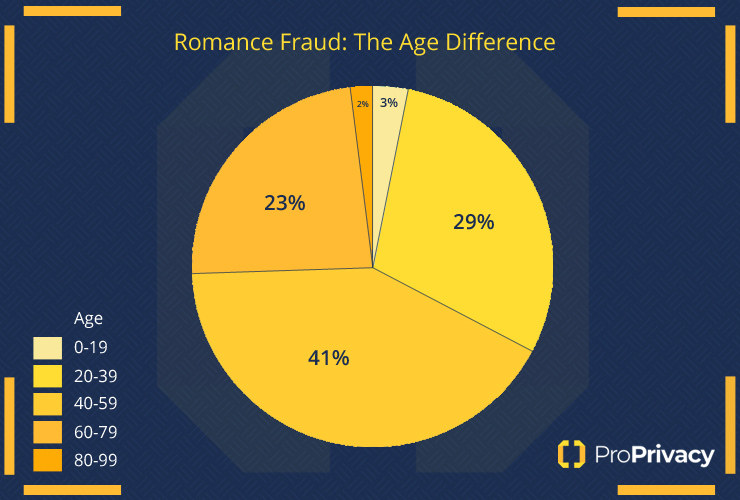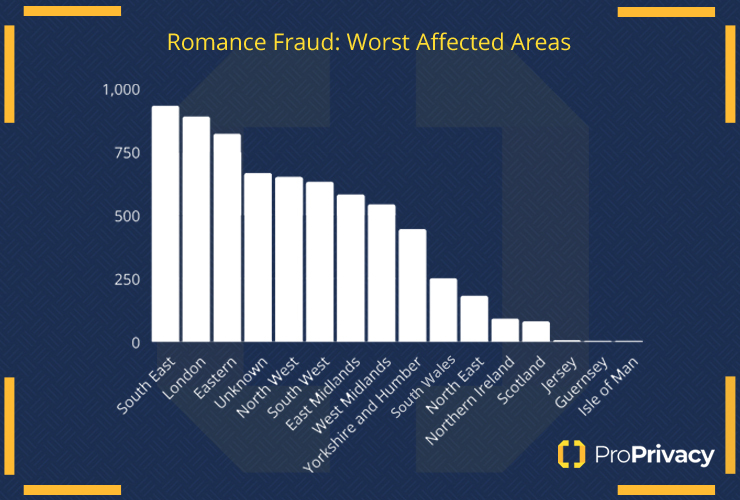Dating Scams in 2020
Romance scams happen when a fraudster creates a false, manipulative online relationship with a victim
- Over £68m was lost between August 2019 and August 2020 in the UK due to romance fraud
- Around 41% of romance fraud victims are aged 40-59
- On average, romance fraud victims lose £11,145
- Reports of romance fraud have risen 26% from 2019
What is a romance scam?
Romance fraud is manipulation at its best - or worst, rather. The perpetrator creates a false online profile to scam a victim into pursuing a romantic "relationship” with them, but all they’re really after is the victim’s money.
Now, you might think it’d be easy to spot one of these scams a mile away. Romance fraudsters are meticulous, however, and spend an awful lot of time setting up a profile to ensnare their victim. To the victim, it’ll likely seem as though they’ve found a perfect match! The connection will be instant (but faked), there’ll be some promise of a future together (that’ll never be kept), and probably some oh-so-convenient shared interests. Unfortunately, it’s all a trap - the fraudster wants the money, not the love.
2020 saw £68.2 million lost as a result of romance fraud; a shocking figure on its own, but doubly so when you consider that only £63 million was lost to online shopping and auction fraud, despite there being thirteen times the number of cases. It's also a significant increase from 2018, where romance fraudsters claimed £50 million.
Action Fraud, a UK-based cybercrime reporting centre, paints a devastating picture of the impact romance fraud has on its victims. It claims that the average British victim loses around £11,145 and that reports of romance fraud are on the rise. In fact, the number of reported cases rose 64% in 2019, and again by 26% in 2020. By the end of 2020, a total of 6,748 instances of romance fraud had been reported, according to data from the National Fraud Intelligence Bureau (NFIB). The Coronavirus lockdowns have certainly affected these figures, but we’ll have a closer look at those details later in the article.
Geographically, the South East of England, as well as London, were the worst hit by romance fraud in 2020, with 932 and 889 respective reports. In comparison, the North West reported a still-shocking 650 occurrences, and Northern Ireland clocked 90. Britain's islands were statistically the least affected by scams of this nature, with Jersey issuing four claims for the year, and Guernsey and the Isle of Man each reporting only two.
Despite its name, romance fraud is anything but romantic. The romance scammers aren’t at all genuine in the feelings they profess - their ploys are calculated, and some scammers can be working multiple victims at the same time. What’s worse, these scams can last for months, if not years. This is all done on purpose, of course. A longer "relationship” builds trust, which in turn makes it that much harder for a victim to deny the fraudster’s request for money. In fact, the longer a fraudster waits before making that monetary request, the larger the amount they generally ask for.
Fraudsters will pick a victim and tailor their profile and personality to match, then cultivate a close romantic relationship, all before finally inventing a problem - a problem they need the victim’s "help” with, which, of course, means their money.
America’s Federal Trade Commission (FTC) asserts that there are myriad ways that a scammer might try and squeeze money out of their target, including:
- Asking for help with travel-associated fees (tickets, visas, and other expenses), either to visit the victim or a member of their own "family”.
- Assistance paying a customs fee
- By claiming they have medical expenses to pay - again, these could be for themselves or for a family member
- By similarly claiming they need help with debts
Romance fraudsters even attempt to manipulate how a victim pays them. They’ll often request that the cash be wired to them, or sent via prepaid gift cards and even Bitcoin torrents. These methods are fast and untraceable, and you can be certain that the fraudster knows that vendors have a hard time refunding them, too.
Victims of romance fraud stand to lose substantial sums of cash - anywhere from £7,000 to £320,000. To cover these outrageous demands, a victim may dip into their overdraft, take out exorbitant loans, or even dip into inheritance money.
But the consequences of romance fraud extend far beyond a victim’s bank account. Often, those targeted by these scammers are overcome with shame and embarrassment. This can lead to a loss of appetite and sleep, and romance scammers will often play on the guilt of a victim. They’ll insist that they don’t share the details of the online relationship with friends and family - and, out of a fear of being seen as "gullible” or being "exposed”, the victim won’t report the crime.
Who does romance fraud affect?
Everyone with access to the internet and an interest in meeting a new partner online could be vulnerable to romance fraud.
Data from the National Fraud Intelligence Bureau (NFIB) shows the scale of the problem of romance scams in 2020.
Reports of Romance scams in 2020
Reports got consistently higher throughout the course of last year, showing an alarming upward trend in cases.

The Gender Difference
Women appeared to be targetted the most for romance fraud in 2020.

The Age Difference
The 40-59 age group suffered the most reports of romance fraud last year.

The Worst Affected Areas
The top five most affected areas were the South East, London, Eastern, North West and South West.

However, the data does not tell the whole story. Scammers tend to target people suffering from anxiety, loneliness and isolation - making recent divorcees or widows a prime target for opportunistic scammers.
Women are more often the targets of romance fraudsters, making up 55% of victims. And women aged 40-59 are at particular risk of being targeted. In fact, 41% of victims fell into this age range, whilst 29% of victims were aged 20-39, and only 23% were 60-79 years-old.
E-Harmony recently revealed that over the next decade, it expects its 55-64-year-old userbase to exhibit the largest growth. Similarly, Match.com has claimed that over 50s are the quickest growing group of online daters. These statistics are mirrored in reports from AGE UK, which claims that a quarter of romance fraud victims are aged 50 and over.
However, being involved in a romance scam does not mean the victim is at all gullible, or that they "should’ve seen it coming”. One of the worst things about these schemes is that they prey on a person’s best qualities, like their compassion, whilst also taking advantage of what might make them vulnerable; loneliness, unfamiliarity with tech, or a simple desire for some company.
Which apps and sites are targeted by romance scammers?
It’s always worth being cautious whenever you make a profile on any site - dating or otherwise (keep reading for some tips on how to do so). There are particular sites and services that romance fraudsters haunt frequently, however. Stay alert if you’re using:
- Messaging apps - like Viber, WhatsApp and Tinder
- Dating sites - which include OutTime, Plenty of Fish, and Match.com
- Social media - particularly Facebook and Instagram
Fortunately, some of these sites are taking it upon themselves to raise awareness of romance fraud. Match.com (the owner of OK Cupid, Tinder, and Plenty of Fish) recently ran a series of adverts. These ads contained information on how to spot a fraudster and what to do to prevent being caught up in a scam, and it’s a great precedent to see. Furthermore, the Match Group joined forces with the City of London police to take on romance fraud, and even help victims reclaim their money.
Romance fraud red flags
Unfortunately, dating sites and messenger apps can’t pick out individual fraudsters for you. There are a few key flags to keep an eye out for, and by identifying them, you’ll be able to tell whether you’re talking to your soulmate or a scammer. We’ve put together a list of warning signs.
A perfect profile
"If it’s too good to be true, it usually is” - remember that old adage? Well, it applies to online profiles, too! Fraudsters spend ages crafting their profiles, and usually do so after having researched their victims via social media. If you happen to state elsewhere that you’re a cat-lover, support a certain sports team, or have a favourite restaurant, then the fraudster can read as much and claim the same. It’s not serendipity, it’s manipulation, so be sure to take the rose-tinted glasses off when browsing profiles.
The love bomb
Now, we’re sure you’re an absolutely charming individual, but you should be wary if the person you’re talking to is full-on from the start. Scammers can crank things into fifth gear very quickly in order to create that intense sense of intimacy. It’ll all be fake, of course, but a scammer will say whatever they need to to get what they want - and that includes calling you their soulmate, the love of their life, or showering you with other flowering proclamations.
The request for money
Death, taxes, and a romance fraudster making a seemingly heartfelt plea for money - it’s all inevitable. After carefully cultivating a false relationship, the scammer will eventually spin another lie in order to get their mitts on your cash. It might be that a family member needs help, that they’re in dire financial straits, or that they need a bit of help paying to come and meet you. The romance fraudster wants you to feel enough compassion and pity for them that you’ll hand over the dough. This is a direct abuse of the trust a victim places in their scammer, though they might flip the switch and try good old fashion guilt-tripping if a victim initially refuses!
Information overload
If someone’s asking you an awful lot of specific questions, you ought to be suspicious. A scammer might inquire as to when your birthday is, where you live, your pet’s name, and they might do it under the guise of sending you a gift, but don’t be fooled. They’re gathering information about you, which can either be used to commit identity fraud or sign you up for malicious emails. It’s also worth comparing how much a person is willing to talk about themselves. A scammer is less likely to open up about their life, but if they do, they might try and make themselves seem heroic and trustworthy by claiming a profession in the military or medical field.
Swapping platforms
Dating sites and messenger apps are typically pretty secure, having all the encryption necessary to keep your conversations and identifiable information private. So, it’ll come as no surprise to learn that scammers would rather talk to you on other sites and apps - ones with markedly fewer safety measures. This makes it harder for authorities to trace them.
Constant evasion
The romance scammer is simply not who they claim to be. The profile is a fake, the picture isn’t of them, and the life they claim to lead will be a lie. For this reason, the fraudster will be reluctant to meet with you in real life. So, be on the lookout for constant excuses as to why someone can’t visit you, or even take part in video calls.
The dos and don’ts of online dating
Now that you know what to look out for, there are a few basic rules to keep in mind when using dating sites or messenger apps. Some of them might seem severe, but when your money and security is on the line, it’s worth taking precautions.
- DO thoroughly check a person’s profile
If you have any suspicions at all, it’s time to act. Take a fine-toothed comb and go through that person’s profile - and take emotion out of the equation, too. Can you verify that the person is telling the truth about where they work and what their name is? Additionally, use tools like Google’s reverse image search and TinEye to see whether profile pictures are fakes taken from the internet. A little bitch of research could save you a whole heap of heartache.
- DON’T send money
This one might seem obvious, but romance scammers are adept at tugging on your heartstrings to get what they want. It’s a good rule to not send money to anyone that you haven’t met in real life. Additionally, anyone who truly cares for you wouldn’t put you on the spot with a demand for cash, let alone berate or guilt-trip you if you decline!
- DO keep your profiles separate
Nowadays, it’s possible to link up all of your social media accounts. We’d be a poor advocacy group if we recommended this, however! Linking your profiles makes it that much easier for a romance fraudster to gather information and tailor an account tailored to you, to dupe you.
- DON’T reveal personal information
Some romance fraudsters are after your identity as well as your money. They’ll need some basic information first, however, and will lean into the trust they’ve cultivated in the relationship to acquire it. If someone’s asking you a bunch of personal questions, be wary - they could be logging this information. Stick to using a first name, and don’t ever hand out a real-life address or email address.
Coronavirus and romance fraud
The advent of Coronavirus brought about a "new normal”, and we’ve all had to adapt. More people are taking to the internet to do just about everything; work, shop, and entertain themselves. Additionally, more folks are using online dating services, seeing as it’s quite difficult to get out and mingle with lockdown restrictions in place.
These lockdowns have played havoc with people’s mental health, however. We’re feeling more lonely than ever before, cut off from friends and family, and it’s natural to seek comfort and company with online contacts.
This blow to our mental health is considerable; according to research undertaken by 87%, it was revealed that 15% of respondents feel more lonely now than they did during the first wave of COVID-19 and that 48% of the workforce feel isolated from those around them. These figures mark a clear increase in anxiety and loneliness - two things a fraudster is more than happy to prey upon, as people flock to dating sites or grow more willing to enter into an online relationship.
Similarly, more than 1,868 instances of romance fraud were reported during the third quarter of 2020, when COVID restrictions were enforced and more people flocked to social media.
But it was in the fourth and final quarter of 2020 where these scams reached their peak. During the build-up to the holiday season, more than 1,946 romance scams were reported - that's 29% of all reports for the year.
Coronavirus also provides a romance fraudster with a few handy excuses they can use to deflect suspicion and leverage sympathy. Not only can a scammer now claim that they need cash to help with debts or travel expenses, but they can now claim to need assistance with caring for an infected relative. The Coronavirus lockdowns present an oh-so-convenient excuse as to why the scammer couldn’t possibly meet with their victim, too!
And it’s not just fake-romantics using the pandemic to cheat people out of their money, data, and security. At ProPrivacy, we launched our own investigation and discovered that there are more than 125,000 malicious Coronavirus websites out there. So, whether it’s taking advantage of people’s compassion or fear, there’s a new breed of crooks capitalizing on the virus. You can read more about our COVID research here!
What to do if you’re involved in a romance scam
First and foremost, stop talking to the person you suspect of being a romance scammer. It might be tempting to confront them or otherwise try to "help” them, but they’re master manipulators, and will no doubt attempt to guilt-trip you into keeping your "relationship” private - and unreported. Instead, follow along with the steps below to ensure that you beat the crook at their own game:
Vet the person’s profile; check out their place of work, name, and profile pictures - it’s possible the scammer has a digital trail that implicates them.
You can then report the scammer on the app or site you’re using. This prevents them from accessing your profile, and allows you to take further action without their interference - and means the site can ban their profile, too.
Next, it’s time to report them to fraud authorities. There are plenty out there, and you might have a local branch that can help you. Otherwise, get in touch with Action Fraud. They’ll pass your report on to the National Fraud Intelligence Bureau.
Don’t be afraid to reach out to friends and family to support you during this time. There’s nothing to be ashamed of - the scammer should be the only party feeling any guilt!
If possible, share your story with others. Your voice has power! Your voice has power, and will go a long way to removing the stigma surrounding victims of romance fraud.
